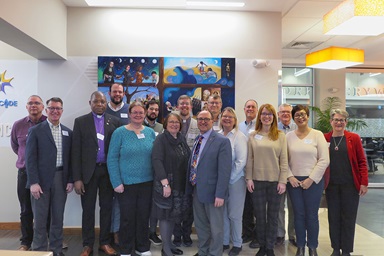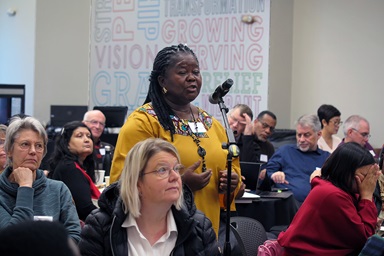United Methodists must consider the future instead of clinging to the past when they decide on the denomination’s budget for the next four years.
That’s the advice of the church’s top financial officer to delegates of the United Methodist General Conference, meeting April 27-May 7.
In her April 29 report, Sandra Kelley Lackore, chief executive of the General Council on Finance and Administration, held up an offering plate to remind herself and conference participants that their decisions are “not just about dollars” but about gifts to God––given by people in the pews.
She acknowledged that the denomination’s financial foundation is in “need of repair,” at least partially due to a narrowing base of support.
Because of membership loss, consolidations and other factors, there were 216 fewer U.S. congregations to contribute funds in 2004, compared to the previous year.
General Conference establishes the total amount of money needed to support all churchwide ministries. That amount is then apportioned to each of the 63 annual (regional) conferences in the United States. Each of those regional units decides upon ways to request fair-share amounts from individual churches. The requested amounts are based on several factors including church budgets and membership.
Currently, half of the total denominational budget is apportioned to only 3,655 of the 34,780 U.S. congregations, according to Lackore.
One challenge at the local level, she said in a follow-up press conference, is to help both clergy and laity realize “the tie that exists between their spiritual life and their giving life.”
According to the council’s written report to General Conference, economic conditions in the United States from 2001-2004 also had “a significant impact on financial receipts for the general apportioned funds.”
Financial demands on local churches have meant fewer dollars to support general church infrastructure. Statistics from 1998, for example, showed that 83.2 cents of each dollar remains in the congregation, while only 12.8 cents goes to support district, annual conference and jurisdictional ministries, and only 4 cents is forwarded for denomination-wide support.
On a more encouraging note, Lackore said that 7 of 10 local congregations paid 100 percent or more of their apportionments to the general church in 2003. “Since 1995, giving in our local churches has gone up more than family income,” she added.
Lackore said later that she also is more optimistic about the American economy, citing analysis from Don House, an economist and a United Methodist who serves on the council’s board of directors. “He believes we are on the other side of this economic recession,” she explained.
The issue of declining funds is not confined to the United Methodist Church. The Presbyterian Church USA will have to slash $9 million from its 2005-06 budget, she reported, and the Evangelical Lutheran Church in America also must trim several million dollars. The Southern Baptists, she noted, have experienced a financial decline over the past decade.
General Conference delegates cannot turn their backs on new mission initiatives or necessities such as pension and benefit plans. But, Lackore said, “As you look at each dollar to be spent –– each new initiative proposed –– you will ask, I hope, ‘Where we are headed?’”
The GCFA’s proposed quadrennial budget of $585 million is “merely a starting point” for delegates, she said. That figure does not include proposals from other agencies or groups; those requests total an additional $80 million for mission initiatives.
Lackore advised delegates to preserve what is worthwhile, eliminate what isn’t and be “innovative” in the process.
The final budget, she said, must reflect what the delegates believe are the missional and financial priorities of the church. “Do not think of it as a budget of dollars, think of it as a sacred trust.”
*Bloom is a United Methodist News Service news writer.
News media contact: (412) 325-6080 during General Conference, April 27-May 7. After May 10: (615) 742-5470.
Radio Stories
Related
Like what you're reading? Support the ministry of UM News! Your support ensures the latest denominational news, dynamic stories and informative articles will continue to connect our global community. Make a tax-deductible donation at ResourceUMC.org/GiveUMCom.





